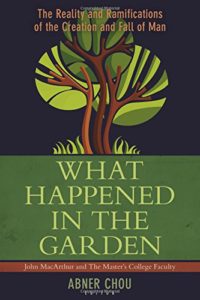 What Happened in the Garden: The Reality and Ramifications of the Creation and Fall of Man, ed. Abner Chou (Kregel Academic, 2016), 304 pages.
What Happened in the Garden: The Reality and Ramifications of the Creation and Fall of Man, ed. Abner Chou (Kregel Academic, 2016), 304 pages.
If Adam was historical, what are the ramifications of the Fall? That’s the question of a new collaborative effort from John MacArthur and the Master’s College faculty, edited by Abner Chou.
The focus on how the Fall effects every sphere of knowledge and action broadens the historical Adam question from Gen 1-2 to include also Gen 3. If (most theories of) evolution is true, Gen 3 must be reinterpreted. This book argues reinterpreting Genesis 3 is not that simple, because it is the foundation for the rest of the story in Scripture. And that foundation intersects every point of life so that modifying our interpretation of Gen 3 will have a “snowball effect” and possibly alter how we understand all of life.
Summary
The first several chapters deal with the Fall’s reality. Editor Abner Chou argues Gen 3 is intended to portray history. Such an interpretation of Genesis 3 might be reasonable were it not for recent scientific objections. Hence, the next two chapters, both authored by Joe Francis, tackle these scientific issues of genetics and science. He argues the creational model can account for the evidence coherently.
R.W. Mackey argues the world of enterprise is “what you would expect” if the Fall were historical. Similarly, the late Taylor Jones presents a scientific study highlighting how thermodynamics changed in the Fall. The details of Genesis 3 accord with what we observe about the nature of entropy in our world. Grant Horner then describes how sin distorts what convicts man’s soul. So for him, even the controversy surrounding the issues of this book points to the reality of Genesis 3. Judge Crawford suggests the distortion of the legal system stems from Gen 3 also.
Some chapters suggest the Bible has theological tension if the Fall is not historical. Paul Thorsell discusses original sin, arguing it arises from Gen 3 itself. Our very own (!!) William Varner reminds us that the Messiah is promised in Genesis 3. Contrary to some skeptics, the first promise of the gospel is in Genesis 3:15. Because of this, if we take away the “history” of the text, the reality of Messiah is also threatened. Ernie Baker argues a historical Gen 3 is relevant for counseling, while Jo Suzuki deals with the matter of gender relations. Alex Granados then explores the implications for education.
John MacArthur sums up the variety of discussions in this book with a passionate plea. The removal of Adam’s historicity erodes the reality of sin, undermines the authority of Scripture, and will shift our entire paradigm of the nature of the world. Genesis 3 provides the answer not only to why the world is the way it is, but also provides the solution to this problem: the second Adam who is as real as the first.
Evaluation
In biblical studies, readers will be divided on a volume such as this. But, agree or not with the premise, here’s one thing I love about this book: it’s seriously interdisciplinary. Ancient thinkers such as Plato, Aristotle, and Aquinas formed integrated systems. If they changed one area of their thought, it necessarily affected their other areas of thought. This book looks at one issue, the Fall, and asks how it affects all areas of thought and life. I think that’s a noble effort and one that stands as an admirable academic exercise.
Readers might desire a bit more argumentation that the genre of Gen 1-3 is intended to be historical. Chou’s chapter argues forcefully that it is historical, but since the rest of the chapters assume it is, much weight rests on Chou’s chapter. But even so, the reader can suspend judgment while reading the rest of the chapters and the enjoy a fruitful exercise of thinking about the problems and benefits of believing Gen 3 is historical.
Personally, I find NT passages such as Rom 5 and Jesus’ teachings to be difficult evidence to get past in order to claim Gen 1-3 isn’t historical, with the only way out typically to charge Paul and Jesus with human ignorance. However, that’s not a path I’m prone to take!
Find What Happened in the Garden here, and read Varner’s chapter!


